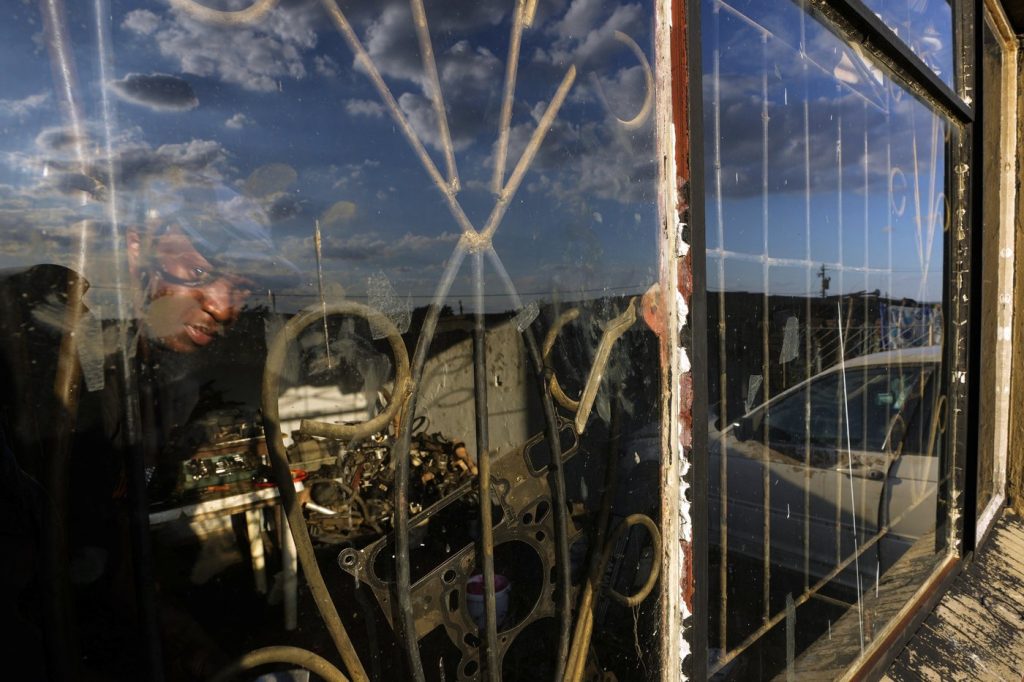BRAKPAN, South Africa (AP) – Themba Maseko, a 39-year-old mechanic, rapidly wipes oil and grease off his hands as he transitions from repairing one vehicle to assisting a customer with a low-riding BMW 325is in the township of Tsakane, approximately 50 kilometers (31 miles) east of Johannesburg. His repair shop, a small enterprise, faces stiff competition from established urban car service centers, but his outlook has significantly improved due to a cooperative initiative launched at the end of the previous year.
Maseko, alongside other mechanics from various townships, has joined a cooperative that enhances their collective purchasing power. This collaborative effort, known as the Motor Spares Collective, allows them to source official car parts and equipment more efficiently, ensuring they are not sidelined by larger businesses. Orders can now be placed via WhatsApp to an online spares shop, with deliveries typically made within 24 hours, a stark contrast to the hours Maseko previously spent waiting in lines for parts only to find them out of stock.
On a busy day at his garage, the demand for Maseko's services is evident as customers line up. "Now with the collective it’s much easier. I don’t have to go stand in line and waste time," expressed Maseko, who transitioned from a career as an electrician to a full-time mechanic in 2008. He emphasized the added benefit of lower prices through the cooperative.
Small businesses play a crucial role in South Africa’s informal sector. The government is increasingly recognizing these enterprises as vital in driving economic growth and job creation, particularly in areas marked by high unemployment and poverty rates. Reports indicate that over 21 million people, a third of South Africa's population, reside in townships surrounding major cities, wielding a combined spending power of billions of dollars and favoring local businesses.
South Africa hosts more than 700,000 registered small businesses. In the townships, these include a diverse range of services like hair salons, taverns, car repair shops, and laundromats, often operating from residential areas. According to a report from financial services group Lesaka, the informal sector is estimated to generate around $33 billion in revenue, constituting over 6% of GDP.
Sharief Bartus, another mechanic within the cooperative, highlighted the challenges faced by township trades: “People don’t respect the trade in the townships.” However, for a $10 monthly membership fee during the first year, Maseko and his peers gain more than just access to spare parts and tools. The collective offers skills development, assistance with business registration, and financing opportunities.
"The more members we get, the more discounts we receive, and consequently, the more work we can handle," noted Dorian Slimmerts, another member of the collective, operating nearby. Township mechanics, who cater to local car owners, face competition from the larger automotive manufacturing and repair sectors. However, a regulatory change in 2020, known as the 'right to repair' rules, allowed car owners to have their vehicles serviced by independent mechanics without losing their warranties, which has opened additional opportunities for township mechanics.
There are approximately 12 million cars on South African roads, and people have increasingly opted to keep their vehicles for longer periods, particularly in the wake of the COVID-19 pandemic, which has shifted demand towards affordable pre-owned cars over new ones.
Time management is crucial for township mechanics, who often deal with walk-in clients, negotiated prices, and the expectation of quick service. Amanda Gcabashe, managing director of UBU Investment Holdings, emphasized that "all the mechanic sells is time," indicating the need for efficient access to spare parts as a solution to address operational challenges. The collective is also exploring the provision of life insurance and other social safety net services to benefit its mechanics.
Bulelani Balabala, founder of the Township Entrepreneurs Alliance, underscored the potential of cooperatives in maximizing the capabilities of small businesses serving millions in townships, labeling this market as one that "can’t be ignored."











